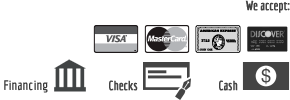Tips
Air Conditioning & Heating Tips
- Keep Your Unit Clean & Clear
Be sure to clean or change your air filter about once a month, and always use the proper size for your unit. It is also important to keep your outside unit clear of debris to avoid blocking the airflow. - Upgrade Your Insulation
For homes built before 1985, it may be necessary to upgrade insulation to reduce cooling and heating costs and make your home more comfortable. - Check Your Thermostat
Cooling your home at 78º or warmer with the fan switch on “auto” can provide the best balance between comfort and savings. For extra savings, raise the thermostat to 82º when you’re not home. - Make Use of Ceiling Fans
Keep your home comfortable and reduce your A/C costs by installing energy-efficient ceiling fans to circulate the air. The average cost to run a fan is only $7 a month! - Maintain Airflow
Keep interior doors and vents open to help circulate the air. - Seal Cracks in Windows and Doors
Sealing small cracks and crevices (less than ¼ inch wide) between a window or door frame and the molding can save 10% of more on your heating and cooling bills and reduce your carbon emissions by hundreds of pounds. - Install a Door Sweep
A simple plastic, self-adhesive door sweep blocks cold air from entering the home via the space between the door and the threshold and improves heating efficiency. - Consider Buying a Newer, More Efficient Heating and A/C Unit
If your system is over 10 years old, it may be time to purchase a new unit. For maximum operating efficiency and energy savings, ask Chuck’s Plumbing & Heating about a system well suited to your situation.
Plumbing Tips
Plumbing problems aren’t always preventable. But you can protect yourself and extend the quality and life of your plumbing system by following a few tried-and-true steps.
- Detect Leaks Early
Leaks are a double threat: they cause damage to faucets and fixtures, and the water lost will show up in your bill. Make fixing existing leaks top priority, and actively check your pipes for hidden links, such as any under your kitchen sink. - Prevent Drain Clogs
Placing a strainer over bathroom drains will prevent hair and other things from accumulating over time to form clogs. - Inspect and Maintain Appliances
Keep an eye on all appliances that are connected to your home’s pipes—washers, dryers, sinks, showers, and water heaters are all potential sources for leaks and other issues. By inspecting them regularly and repairing as needed, you can avoid the need for more costly solutions down the line. - Protect Your Pipes
Frozen pipes can cause major problems that require professional help. Make certain you take the proper precautions to winterize yours. A word of caution: Outdoor pipes aren’t the only ones that can freeze. It can happen in unheated indoor spaces as well, like attics and garages. - Note Unusual Noises
When pipes moan, hum or shriek, there might be an obstruction in the system somewhere that’s causing higher than normal water pressure. This may be easily fixed by simply replacing a washier that’s worn out. It can also be something more complicated such as having a high-pressure flushing, or in the worst case scenario, needing some or all of the pipes replaced. When in doubt, get assistance from the plumbing pros at Chuck’s.
